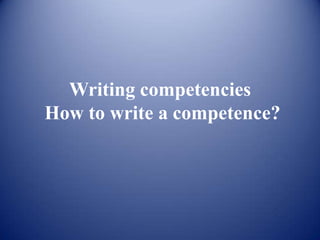
Writing competencies
- 1. Writing competencies How to write a competence?
- 2. What is competency? • A competency is the capability to apply or use a set of related knowledge, skills, and abilities required to successfully perform "critical work functions" or tasks in a defined work setting. Competencies often serve as the basis for skill standards that specify the level of knowledge, skills, and abilities required for success in the workplace as well as potential measurement criteria for assessing competency attainment.
- 3. What we have to take into account to write a competence?
- 4. 1. Begin with a present tense action verb. 2. Each action verb requires an object. 3. Each competency is measurable and/or observable. 4. Each competency is based on performance. 5. Do not use evaluative or relative adjectives. 6. Do not use evaluative or relative adverbs. 7. Do not use qualifying phrases. 8. Say what you mean, using only necessary words.
- 5. Quick Tips to writing competencies • Define competencies simply and clearly. • Make sure competencies evolved a single, identifiable characteristic. • Avoid making the competency too specific. • Once you have finished writing your competencies, you should have them reviewed by Subject Matter Experts to verify their accuracy
- 9. Examples of competencies • Area of communication -Shares information appropriately and openly. • Teamwork -Works in concert with others toward shared goals. • Creativity -Supports an environment that is conducive to new ways of doing things.
